Teething marks a crucial milestone in a baby's early development, representing the transition from infancy into a new growth phase. Typically beginning around six months of age, this natural process can significantly vary, with some infants starting as early as three months and others not until twelve months.
As tiny teeth begin to break through the gums, many babies endure discomfort, leading to symptoms such as irritability and sleeplessness. This period can be particularly anxiety-inducing for new parents and caregivers, who often seek to understand and alleviate the challenges of teething. Being well-informed helps ease concerns and fosters a supportive atmosphere for the baby and caregiver.
Understanding Teething
Teething is when an infant's primary teeth, commonly known as baby teeth, emerge through the gums. This vital developmental phase often starts around six months, although some babies may have teeth as early as three months or as late as twelve months.

The dental development timeline follows a general pattern: the two lower central incisors typically appear first, followed by the upper central incisors between eight to twelve months. By age three, most children will have all 20 primary teeth in place.
During this time, parents usually notice signs of discomfort, such as increased drooling, fussiness, and a strong urge to chew on various objects. Understanding the teething process can significantly alleviate parental worries, allowing for better care and comfort measures during this critical developmental stage.
Signs Of Teething
Teething is a noteworthy milestone in an infant's development, often accompanied by various symptoms that can vary widely among babies. One of the most apparent signs of teething is excessive drooling, which can lead to a rash around the mouth. Babies may frequently chew on objects, from toys to their own fingers, to relieve the pressure on their gums caused by the emerging teeth.
Fussiness and irritability are also typical during this stage; many babies appear more distressed as they cope with the discomfort associated with teething. Swollen gums are often evident, presenting as red and inflamed areas where teeth push through. Lastly, many parents observe that their infants struggle with sleep due to discomfort and disrupted routines.
It's important to understand that teething symptoms can vary significantly from one baby to another; while some might exhibit all these signs, others may only show slight discomfort. Paying close attention to your baby’s cues can help you support them through their unique teething journey.
When Does Teething Usually Begin?
Teething generally commences between 4 and 7 months of age. Parents should expect the first teeth to emerge within this timeframe, although it's essential to acknowledge that each child is unique. Some babies may start teething as early as three months, while others might not see their first tooth until they reach one year old. This variability is entirely normal and can be influenced by genetics and overall health.
The order in which teeth emerge is also relatively consistent. Typically, the lower front teeth (central incisors) appear first, followed by the upper front teeth. The lateral incisors, first molars, canines, and second molars slowly follow, culminating in a complete set of primary teeth by approximately three years of age. Understanding this timeline equips parents to anticipate teething signs and provide comfort during this essential developmental phase.
Teething Myths And Facts
Parents often encounter unsettling myths surrounding teething that can lead to unnecessary worry. A common misconception is that teething results in fever; however, scientific evidence does not support this idea. While some babies may experience a slightly elevated temperature, actual fevers (over 100.4°F) typically signal an illness rather than teething. Similarly, the myth that teething causes diarrhoea can mislead parents. However, some children may present with loose stools, so exploring other potential causes, such as dietary changes or infections, is critical.
Instead, common symptoms linked to teething include minor irritability, drooling, and an increased desire to chew on objects. Familiarizing themselves with these facts empowers parents to navigate this developmental stage without succumbing to myths that may exacerbate their concerns.
Fostering clear communication about teething can alleviate fears and equip parents with valuable insights into supporting their children through this important phase.
Tips For Comforting A Teething Baby
While teething can be challenging for babies and parents, several effective methods can help soothe discomfort. One popular remedy involves the use of teething rings or chilled washcloths. Teething rings, made from rubber or plastic, can be kept in the refrigerator to provide a cool surface for babies to chew on, offering relief from the pain of emerging teeth. A cold washcloth can also be an excellent alternative—dampen it, refrigerate it for a while, and allow your baby to gnaw.

If your baby is old enough for solids, consider offering cool, soothing snacks like chilled yoghurt, applesauce, or pureed fruit to comfort your baby while satisfying their hunger. Additionally, gently massaging your baby's gums with a clean finger can provide relief and reinforce the bond between you and your child.
Should discomfort persist, consult with a paediatrician regarding over-the-counter pain relief options. Always check with your healthcare provider before administering medications to ensure they suit your baby's age and health condition. These strategies can help ease the teething experience and provide comfort during this natural developmental process.
When To Consult A Pediatrician
While teething is a normal part of infancy, parents should contact a paediatrician if their baby exhibits severe, prolonged, or concerning symptoms. Signs such as high fever, persistent vomiting, excessive drowsiness, or difficulty Breathing require immediate medical attention. Additionally, if your baby appears exceptionally irritable or symptoms persist for more than a few days without improvement, seeking consultation with a healthcare professional is crucial. Ignoring these warning signs may lead to complications, so it's better to err on the side of caution and seek expert advice when uncertain about your child's health. Your paediatrician can offer guidance tailored to your baby's unique situation.
Navigating The Teething Journey
Understanding teething is essential for parents navigating this significant phase in their baby's development. Remember, teething is a natural and familiar experience for infants, often accompanied by various signs and symptoms that reflect their journey. Preparing with knowledge and comfort strategies can ease the baby's and parents' transition. If concerns emerge or if your baby appears particularly distressed, do not hesitate to seek guidance from a paediatrician. With the proper support, parents can confidently navigate this crucial milestone in their child's growth.








